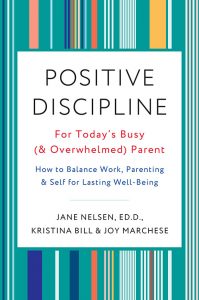Written by Jane Nelsen, EdD; Joy Marchese, MA, CPDT, and Kristina Bill
One problem with praise and rewards is that they work. Not only that; kids love both, and will often behave better to receive them. Yikes! But hang on, what are our children learning long-term? They are learning to “behave” well to receive validation from someone else. Who then, has the power to make the child feel good? The person (parent, teacher etc.) who is giving the goods. This is called “external” control. What happens when those “others” are not around? These kids lack a strong sense of “self” and what we call an internal locus of control – to do the right thing when no one is looking because it feels good. They risk being turned into approval junkies and may fear taking healthy risks needed to build resilience and life skills. So yes, praise and rewards work in the short term— as does punishment by the way! But do you want your child to rely on you for his sense of self-worth or find that within himself?
Joy Marchese, MA remembers: “In my first teaching job, I was working with early intervention special needs children. I was just out of University and pretty green! I was thrown into a situation that was down-right chaos. I turned to the school’s veteran teachers and they taught me my very first classroom “management” tool; reward charts. Every time a student did something “good” they received a sticker. After 5 stickers, they got to pick a prize out of my treasure chest. This seemed to work. One day, one of my little pupils took the initiative and put all the napkins and cups out for our class party. I was about to “praise” her for doing a good job and to make an example of her for the rest of the students. She came up to me and put out her hand. “Great, she wants a high 5” I thought. Instead, she looked me straight in the eye and said, “sticker!” A light bulb went off in my head. I realized that I was training her to only do good deeds for rewards, and not because it was helpful for the greater community. Like Pavlov’s dog!”
Just remember that praise is like candy: a little bit can be so satisfying but too much is damaging to long-term health.
The alternative to praise and rewards
The alternative to praise and rewards is encouragement. The differences between encouragement and praise can be difficult to grasp if you believe in praise and have seen immediate results. Maybe you’ve seen your children respond to praise with beaming faces. What we are concerned with are the long-term effects of our parenting and as we’ve already seen, praise and rewards is not encouraging because it teaches children to depend on others to evaluate their worth. Encouragement on the other hand, leads to self-reflection and self-evaluation. It thereby helps the child develop valuable character and life skills. As Rudolph Dreikurs said, “Encourage the deed or effort, not the doer.” In other words, instead of, “You got an A, I’m so proud of you,” try, “Congratulations! You worked hard. You deserve it.” A subtle difference, but it will change the perception of your child. It may feel counterintuitive at first but encouragement strengthens your connection with your child. You are not making her dependent on your opinion of her, instead communicating to her that you believe in her ability to make the right decisions for herself.
If you’ve been relying on praise and rewards, it may take a little practice to see the difference with encouragement. Keeping the following questions in mind can help:
- Am I inspiring self-evaluation or dependence on the evaluation of others?
- Am I being respectful or patronizing?
- Am I seeing the child’s point of view or only my own?
- Would I make this comment to a friend?
We find the last question especially helpful. The comments we make to friends usually fit the criteria for encouragement.
Does this mean you can never tell your child you’re proud of him? Of course not. To feel belonging, children do want to hear this from time to time. Just remember that praise is like candy: a little bit can be so satisfying but too much is damaging to long-term health.
Jane Nelsen Ed.D., Kristina Bill, and Joy Marchese are authors of the book POSITIVE DISCIPLINE FOR TODAY’S BUSY (AND OVERWHELMED) PARENT:How to Balance Work, Parenting, and Self for Lasting Well-Being, a targeted, user-friendly guide that gives parents the tools they need to parent effectively without sacrificing their well-being or giving up on their life goals.
Jane partners with Positive Discipline educators Joy Marchese and Kristina Bill to help parents who feel increasing pressure to excel at parenting, work, and personal relationships. Instead of feeling fragmented and guilty, parents will learn how to integrate all areas of life and make the most out of their time, energy, and relationships.




No Comment